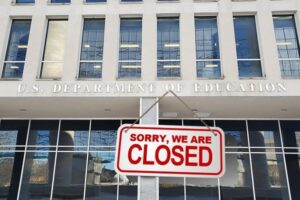
Government Shutdown Could Delay ED Rule Making
All rule-making sessions for the Department of Education were held online from the start of the COVID pandemic to the beginning of the second Trump administration.
J. David Ake/Getty Images
If the government shuts down Wednesday, it’s not clear whether the Department of Education will be able to continue with the meetings it had planned to iron out a batch of regulatory changes this week.
The advisory rule-making committee began its work Monday and was originally slated to continue through Friday. But at the start of Monday’s meeting, department officials noted that if the government runs out of funding Oct. 1, the remainder of the session would be delayed and the plan would be to resume virtually in two weeks. (This was consistent with a pending notice that was posted to the Federal Register in the morning.)
That all changed once again moments before Monday’s meeting ended when Jeffrey Andrade, the deputy assistant secretary for policy, planning and innovation, said the department was reconsidering its earlier statement and that the negotiated rule-making committee might be able to continue operating in person through the end of the week.
“There is a possibility that we can work through this,” Andrade said, adding that he had just received word of the possibility himself.
The department is planning to furlough nearly 87 percent of its employees, according to its shutdown contingency plan. But officials are planning to keep employees who are working on the rule-making process on board as well as those working to implement Congress’s One Big Beautiful Bill Act, which passed in July.
This rule-making session is focused on clarifying the details of new graduate loan caps and a consolidated version of the multiple existing income-driven repayment plans.
Going into this week’s meetings, multiple higher education experts said that finalizing new regulations before the caps and repayment plans take effect July 1, 2026, would be difficult no matter what. A government shutdown, one added, could throw a wrench into the already tight timeline.
“With such a crunched timeline for finishing the rules in the first place, this makes the department’s job much more challenging,” said Clare McCann, managing director of policy for the Postsecondary Education and Economics Research Center at American University.
One of this week’s rule-making committee members, who spoke with Inside Higher Ed on the condition of anonymity, said that while they were still uncertain how the rest of the week will play out, Andrade’s last-minute announcement gave them hope.
“I’m not sure what to make of it and will be waiting for clearer answers in the morning,” the committee member said. “But I know the department is working hard to get as much done as possible.”
That said, if the session does end up moving online, it wouldn’t be too out of the ordinary for department staff members. All sessions prior to the start of the second Trump administration were held online since the COVID-19 pandemic broke out in 2020.
The real challenge, McCann noted, would likely be having enough staff to facilitate the session, regardless of its modality.
“Certainly the department will be able to keep some of this moving, but they will undoubtedly also have some employees who are not considered essential and are furloughed during a shutdown,” McCann said. “It takes many people at the department to make a rule making happen, and so any loss of personnel is going to present a challenge, even if they’re able to keep some of the core team that’s involved.”
Under the contingency plan, student aid distributions will not be paused and loan payments will still be due. The department will, however, pause civil rights investigations and cease grant-making activities, though current grantees will still be able to access funds awarded by Sept. 30.
Source link


